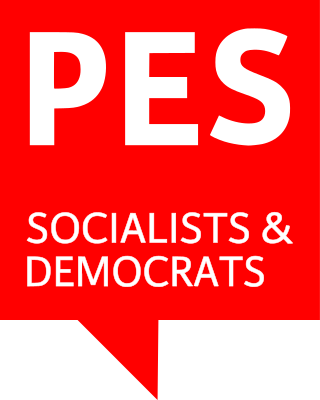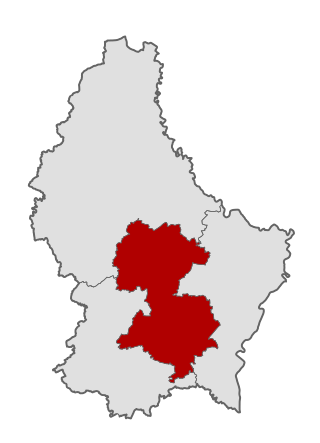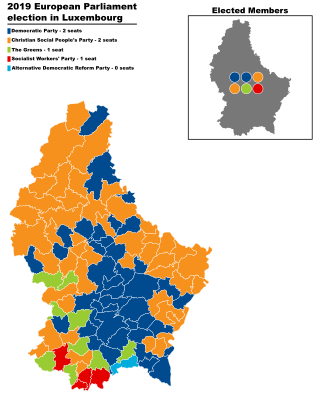
The Free Party of Luxembourg (Luxembourgish : Fräi Partei Lëtzebuerg), abbreviated as FPL, was a political party in Luxembourg.

The Free Party of Luxembourg (Luxembourgish : Fräi Partei Lëtzebuerg), abbreviated as FPL, was a political party in Luxembourg.
Founded in 2003, it emerged onto the political scene in the run-up to the 2004 legislative elections for the Chamber of Deputies. It fielded 8 candidates, none of whom was elected. The party totalled 0.1% of votes cast nationally, finishing last of the eight party lists. Following the 2004 legislative elections, the party had difficulty in continuing to organise.
Most of the party's candidates were from the northern Éislek region of Luxembourg. This is a sparsely-populated area characterised by its relative isolation from the south of Luxembourg.
The FPL's founder, Jean Ersfeld, is a local personality with a limited following in that region. The party's manifesto was essentially right-wing and nationalist, seeking to appeal to the rural communities in the north.
Among the issues of concern to supporters of the FPL was immigration. As in other small countries of Europe, such as Monaco, the European Union's support for political rights for immigrants has been viewed as particularly problematic.
Luxembourg is a parliamentary representative democratic monarchy, whereby the prime minister is the head of government, and the multi-party system. Executive power is under the constitution of 1868, as amended, exercised by the government, by the grand duke and the Council of Government (cabinet), which consists of a prime minister and several other ministers. Usually, the prime minister is the leader of the political party or coalition of parties having the most seats in parliament. Legislative power is vested in both the government and parliament. The judiciary is independent of the executive and the legislature.

The Party of European Socialists (PES) is a social democratic European political party.

The politics of Belgium take place in the framework of a federal, representative democratic, constitutional monarchy. The King of the Belgians is the head of state, and the prime minister of Belgium is the head of government, in a multi-party system. Executive power is exercised by the government. Federal legislative power is vested in both the government and the two chambers of parliament, the Senate and the Chamber of Representatives. The federation is made up of (language-based) communities and (territorial) regions. Philippe is the seventh and current King of the Belgians, having ascended the throne on 21 July 2013.

The Farabundo Martí National Liberation Front is a Salvadoran political party and former guerrilla rebel group.

Jean-Claude Juncker is a Luxembourgish politician who was the 23rd prime minister of Luxembourg from 1995 to 2013 and 12th president of the European Commission from 2014 to 2019. He also was Finance Minister from 1989 to 2009 and President of the Eurogroup from 2005 to 2013.

The Christian Social People's Party is the largest political party in Luxembourg. The party follows a Christian democratic and conservative ideology and has been described as centre to centre-right. Furthermore, akin to most parties in Luxembourg, it is strongly pro-European. The CSV is a member of the Christian Group, European People's Party, and the Centrist Democrat International.

The Luxembourg Socialist Workers' Party, abbreviated to LSAP or POSL, is a social democratic, pro-European political party in Luxembourg. The LSAP sits on the centre-left of the political spectrum.

Elections to the European Parliament take place every five years by universal adult suffrage; with more than 400 million people eligible to vote, they are the second largest democratic elections in the world after India's.

Elections in Belgium are organised for legislative bodies only, and not for executive functions. Direct elections take place for the European Parliament, the Chamber of Representatives, the Parliaments of the Regions, the Parliaments of the Communities, the provincial councils, the municipal councils and the councils of Districts of Antwerp. Voting is mandatory in federal elections, and all elections use proportional representation which in general requires coalition governments.
Elections in Luxembourg are held to determine the political composition of the representative institutions of the Grand Duchy of Luxembourg. Luxembourg is a liberal representative democracy, with universal suffrage guaranteed under its constitution. Elections are held regularly, and are considered to be fair and free.

The Alternative Democratic Reform Party is a conservative and mildly populist political party in Luxembourg. It has five seats in the sixty-seat Chamber of Deputies, making it the fourth-largest party. In 2024, the party received its first seat in the European Parliament.

The Chamber of Deputies, abbreviated to the Chamber, is the unicameral national legislature of Luxembourg. The metonym Krautmaart is sometimes used for the Chamber, after the square on which the Hôtel de la Chambre is located.

Jean Asselborn is a Luxembourgish former politician who served in the government of Luxembourg as Minister for Foreign Affairs from 2004 until 2023. He also served as Deputy Prime Minister from 2004 to 2013, under Prime Minister Jean-Claude Juncker. At the time of his retirement from national politics in 2024, he consistently ranked as the most popular politician in Luxembourg, with a popularity rate of around 80%.

South is one of the four multi-member constituencies of the Chamber of Deputies, the national legislature of Luxembourg. The constituency was established in 1919 following the introduction of proportional representation for elections to the Chamber of Deputies. It consists of the cantons of Capellen and Esch-sur-Alzette. The constituency currently elects 23 of the 60 members of the Chamber of Deputies using the open party-list proportional representation electoral system. At the 2023 general election it had 111,884 registered electors.

East is one of the four multi-member constituencies of the Chamber of Deputies, the national legislature of Luxembourg. The constituency was established in 1919 following the introduction of proportional representation for elections to the Chamber of Deputies. It consists of the cantons of Echternach, Grevenmacher and Remich. The constituency currently elects seven of the 60 members of the Chamber of Deputies using the open party-list proportional representation electoral system. At the 2023 general election it had 40,246 registered electors.

North is one of the four multi-member constituencies of the Chamber of Deputies, the national legislature of Luxembourg. The constituency was established in 1919 following the introduction of proportional representation for elections to the Chamber of Deputies. It consists of the cantons of Clervaux, Diekirch, Redange, Vianden and Wiltz. The constituency currently elects nine of the 60 members of the Chamber of Deputies using the open party-list proportional representation electoral system. At the 2023 general election it had 52,922 registered electors.

Centre is one of the four multi-member constituencies of the Chamber of Deputies, the national legislature of Luxembourg. The constituency was established in 1919 following the introduction of proportional representation for elections to the Chamber of Deputies. It consists of the cantons of Luxembourg and Mersch. The constituency currently elects 21 of the 60 members of the Chamber of Deputies using the open party-list proportional representation electoral system. At the 2023 general election it had 81,687 registered electors.
Jean Ersfeld is a politician from Luxembourg.

Medardo González Trejo is a Salvadoran politician. He was the secretary general of the Farabundo Martí National Liberation Front (FMLN) from 2004 to 2019. He currently serves as a deputy in Legislative Assembly of El Salvador.

Elections for the 2019 European Parliament election in Luxembourg were held on 26 May 2019. Ten parties contested the election for Luxembourg's six seats in the European Parliament.